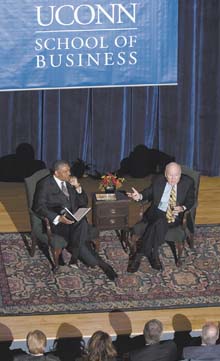  |
| HOME | THIS ISSUE | CALENDAR | GRANTS | BACK ISSUES | < BACK | NEXT > |
‘Toughest Boss in America’ offers advice on management methodsby David Bauman - October 24, 2005 | ||||
|
Having a role model or mentor in business is one of the worst ideas ever invented, according to retired General Electric CEO Jack Welch. “The person you pick might be a turkey,” the former corporate leader told William C. Hunter, dean of the School of Business, in an appearance last week before an audience of business school students to discuss topics and answer questions related to his newest book, Winning. “Every encounter you have is a learning experience,” Welch said. “You are never going to have all the answers. Try and learn from one another. Everyone is a mentor. That’s how I think all the time.” As one of the most celebrated corporate leaders of the 20th century, Welch, who spent 41 years at GE, including 20 as its CEO, earned nicknames ranging from “Toughest Boss in America” to “Neutron Jack” for his controversial philosophy that included views such as managers must fire employees who don’t deliver. Admired or hated, during Welch’s tenure, GE’s market value grew from $13 billion to $500 billion, making it the world’s most valuable corporation, and Welch’s management innovations made him the most influential CEO of his era. In 2000, he was named Manager of the Century by Fortune magazine. In 2005, he was voted Most Admired CEO of the past 20 years by Chief Executive magazine readers, and the World’s Greatest Leader today in a Fast Company magazine survey. Winning, co-authored with Suzy Welch, his new wife and former editor of Harvard Business Review, is a collection of the business management expertise that Welch developed and refined over the course of his career. Visiting UConn as part of a book promotion tour to top business schools around the country, Welch didn’t have a prepared speech but was open to questions from a packed house of mostly business students in the Student Union Theatre. Among the questions, Welch was asked what value he placed on earning an MBA degree. The MBA should help graduates differentiate themselves from the crowd and provide an immediate bump in salary, but only for the first day on the job, Welch said. “The second day you go to work, no one cares. Then it’s all about your ability to deliver, your performance.”
Asked about China’s growing economic prowess, Welch marveled, “they’re buying airplane engines like grapes and power plants like apples.” He said an “amazing transformation” is taking place, as China modernizes and moves into more advanced industries. “I see it as an opportunity rather than a threat,” he said, but he qualified his answer by commenting that companies with high labor costs “are dead.” Asked about his controversial views on employee performance, Welch said, “Business is no different than a game, and what we’re trying to do is build the best team. In baseball the worst players on a team get cut, and it’s accepted because the team with the best players wins. Firing someone for non-performance ain’t bad. What’s bad is waiting until they’re 50, after they’ve been there 30 years. We have no right to manage anyone who doesn’t know exactly where they stand.” Offering advice to business school graduates, Welch said, “When you leave school and get a good job, that first job will be about you. Then within a year or two, you’ll get a promotion and you’ll become a manager. " Learn at that moment that it’s no longer about you, but about them. You’re only as good as the reflected glory you get from the work of your people. Management isn’t you doing it. Management is exciting others to do it better than you ever could have done it.” |
| ADVANCE HOME UCONN HOME |

